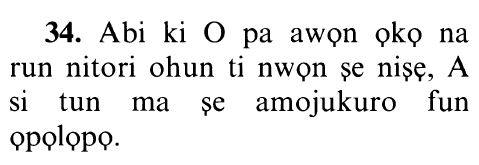42vs34
Select any filter and click on Go! to see results
أَوْ يُوبِقْهُنَّ بِمَا كَسَبُوا وَيَعْفُ عَن كَثِيرٍ
Aw yoobiqhunna bima kasaboo wayaAAfu AAan katheerin
Index Terms
Click to play
Yoruba Translation

Hausa Translation
Kõ Ya halakã su (sũ jirãgen) sabõda abin da mãsu su suka sanã´anta, alhãli kuwa Yanã yãfe (laifuffuka) mãsu yawa.
Asbabu n-Nuzuul (Occasions of Revelation)
أَوْ يُوبِقْهُنَّ بِمَا كَسَبُوا ...
Or He may destroy them because of that which their (people) have earned.
means, if He wills, He may destroy the ships and drown them, because of the sins of the people on board.
... وَيَعْفُ عَن كَثِيرٍ ﴿٣٤﴾
And He pardons much.
means, of their sins;
if He were to punish them for all of their sins, He would destroy everyone who sails on the sea.
Some of the scholars interpreted the Ayah َوْ يُوبِقْهُنَّ بِمَا كَسَبُوا (Or He may destroy them because of that which their (people) have earned).
as meaning, if He willed, He could send the wind to blow fiercely so that it would take the ships and divert them from their courses, driving them to the right or the left, so that they would be lost and would not be able to follow their intended path.
This interpretation also includes the idea of their being destroyed.
This also fits the first meaning, which is that if Allah willed, He could cause the wind to cease, in which case the ships would stop moving, or He could make the wind fierce, in which case the ships would be lost and destroyed. But by His grace and mercy, He sends the wind according to their needs, just as He sends rain that is sufficient. If He sent too much rain, it would destroy their houses, and if He sent too little, their crops and fruits would not grow.
In the case of lands such as Egypt, He sends water from another land, because they do not need rain; if rain were to fall upon them, it would destroy their houses and cause walls to collapse.
أي ولو شاء لأهلك السفن وغرقها بذنوب أهلها الذين هم راكبون فيها " ويعفوا عن كثير " أي من ذنوبهم ولو آخذهم بجميع ذنوبهم لأهلك كل من ركب البحر وقال بعض علماء التفسير معنى قوله تعالى " أو يوبقهن بما كسبوا " أي لو شاء لأرسل الريح قوية عاتية فأخذت السفن وأحالتها عن سيرها المستقيم فصرفتها ذات اليمين أو ذات الشمال آبقة لا تسير على طريق ولا إلى جهة مقصد وهذا القول هو يتضمن هلاكها وهو مناسب للأول وهو أنه تعالى لو شاء لسكن الريح فوقفت أو لقواه فشردت وأبقت وهلكت ولكن من لطفه ورحمته أنه يرسله بحسب الحاجة كما يرسل المطر بقدر الكفاية ولو أنزله كثيرا جدا لهدم البنيان أو قليلا لما أنبت الزرع والثمار حتى إنه يرسل إلى مثل بلاد مصر سيحا من أرض أخرى غيرها لأنهم لا يحتاجون إلى مطر ولو أنزل عليهم لهدم بنيانهم وأسقط جدرانهم .
"أو يوبقهن" عطف على يسكن أي يغرقهن بعصف الريح بأهلهن "بما كسبوا" أي أهلهن من الذنوب "ويعف عن كثير" منها فلا يغرق أهله
أي وإن يشأ يجعل الرياح عواصف فيوبق السفن أي يغرقهن بذنوب أهلها . وقيل : يوبق أهل السفن .
I'raab - grammatical analysis of the Qur'an
«أَوْ» حرف عطف «يُوبِقْهُنَّ» مضارع ومفعوله والفاعل مستتر والجملة معطوفة على ما قبلها «بِما» متعلقان بالفعل «كَسَبُوا» ماض وفاعله والجملة صلة ما «وَيَعْفُ» معطوف على يسكن فهو مجزوم مثله وعلامة جزمه حذف حرف العلة والفاعل مستتر «عَنْ كَثِيرٍ» متعلقان بالفعل
